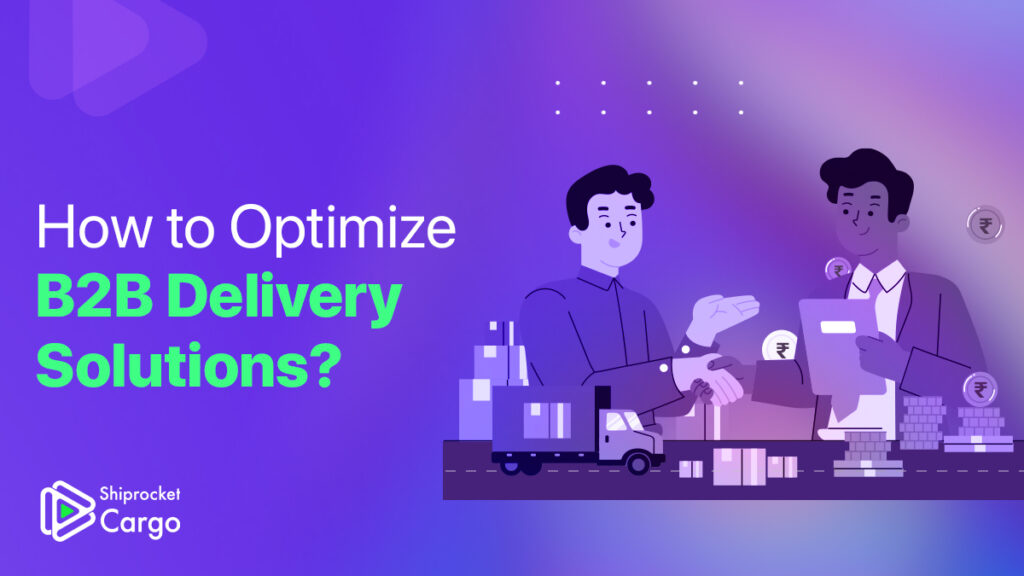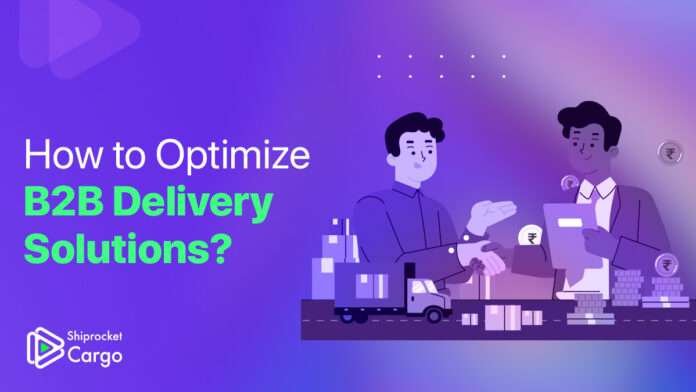Table of Contentshide
In the fast-paced world of B2B eCommerce, efficient delivery solutions significantly ensure optimum customer satisfaction. It also helps optimise operations in the best possible manner. Timely and fast delivery are the key components driving growth and maintaining strong customer relationships. This blog will tell you eight best practices for implementing efficient B2B delivery solutions that impact customer loyalty and streamline logistics processes. By implementing these practices, organisations can streamline operations, reduce costs, and enhance customer satisfaction.

Efficient inventory management is critical in ensuring successful B2B delivery solutions. Businesses can enhance their performance by implementing inventory management software, enabling them to effectively monitor stock levels, track product demand, and forecast future requirements. This data-driven approach prevents stockouts, minimises excess inventory, and ensures precise order fulfillment. Adopting a robust warehouse management system optimises storage space, streamlines picking and packing processes, and minimises errors encountered during order fulfillment.
By taking advantage of cutting-edge technologies, businesses can maximise the efficiency of delivery routes, ultimately minimising fuel consumption. Through warehouse management systems (WMS) integration, businesses can automate essential processes, such as inventory tracking and order fulfillment, resulting in smoother operations. Additionally, the implementation of delivery management software allows for the seamless tracking of drivers, monitoring of delivery statuses, and the convenience of electronic proof of delivery. By embracing these technological solutions, companies can achieve real-time visibility into their delivery processes, significantly improve operational efficiency, and reduce costs.
Continuous improvement is a fundamental aspect of efficient B2B delivery solutions. Regularly review and evaluate your delivery processes to identify bottlenecks, inefficiencies, and areas for optimisation. Frequent review and evaluate your delivery processes to identify bottlenecks, inefficiencies, and areas for optimisation. By embracing a culture of continuous improvement, businesses can make incremental changes that significantly enhance delivery efficiency over time.
The last mile of the delivery process presents unique challenges in B2B commerce. Optimising last-mile delivery can significantly impact customer satisfaction and overall efficiency. Employing route planning software, GPS tracking, and real-time delivery updates allows for efficient scheduling and reduces delivery times. Collaboration with logistics partners to identify the most efficient transportation routes and modes can also improve cost-effectiveness. Embracing innovative solutions like crowd-shipping and lockers for package collection can enhance convenience and flexibility in last-mile delivery.
In B2B commerce, returns play a significant role, and efficient returns management is vital for customer satisfaction and cost management. It is essential to establish a well-structured returns process that includes unambiguous guidelines, easily accessible return labels, and the ability to manage reverse logistics seamlessly. Leveraging automated systems for returns processing and inspection can enhance efficiency and decrease the time required for processing. By prioritising returns management, businesses can elevate customer experiences, foster trust, and gain a competitive edge in the market.
Regular performance tracking and analysis are essential to identify areas for improvement in B2B delivery solutions. Implementing key performance indicators (KPIs) and real-time tracking systems allow businesses to monitor critical metrics, such as on-time delivery rates, order accuracy, and customer satisfaction. Analysing this data can reveal bottlenecks, operational inefficiencies, and opportunities for optimisation. By identifying trends and patterns, businesses can implement targeted strategies to enhance their deliveries quickly.
Effective and clear communication is the foundation of any successful B2B delivery solution. Establishing clear communication channels between all stakeholders involved, including suppliers, manufacturers, distributors, and customers, is essential. Adopting technology-driven platforms that enable real-time tracking, notifications, and updates can ensure transparency and enhance collaboration. This level of communication minimises errors, eliminates confusion, and allows for quick resolution of any delivery-related issues.
Collaboration with reliable partners is crucial for efficient B2B delivery solutions. Building relationships with trusted carriers, freight forwarders, and logistics providers ensures smooth coordination and timely deliveries. It is essential to select partners who align with your business values and prioritise customer satisfaction. By fostering these partnerships, businesses can leverage the expertise and resources of their partners to enhance delivery efficiency and meet customer expectations consistently.
In conclusion, implementing efficient B2B delivery solutions is critical in driving success and maintaining a competitive edge in the modern business landscape. By adopting the best practices outlined in this article, organisations can optimise their delivery processes, reduce costs, and enhance customer satisfaction. Businesses can stay one step ahead of their competition by establishing themselves as reliable partners, fostering strong relationships with customers, and driving sustainable growth in the long run.
Last-mile delivery optimisation significantly impacts customer satisfaction and overall efficiency. Businesses can schedule deliveries efficiently and reduce delivery times by employing route planning software, GPS tracking, and real-time delivery updates.
Communication is crucial in efficient B2B deliveries because it helps manage expectations and build strong client relationships.
Focusing on reverse logistics, including returns and exchanges, is essential in B2B delivery solutions because it improves customer satisfaction and reduces costs associated with returned products.
Post Disclaimer
The information provided in our posts or blogs are for educational and informative purposes only. We do not guarantee the accuracy, completeness or suitability of the information. We do not provide financial or investment advice. Readers should always seek professional advice before making any financial or investment decisions based on the information provided in our content. We will not be held responsible for any losses, damages or consequences that may arise from relying on the information provided in our content.



